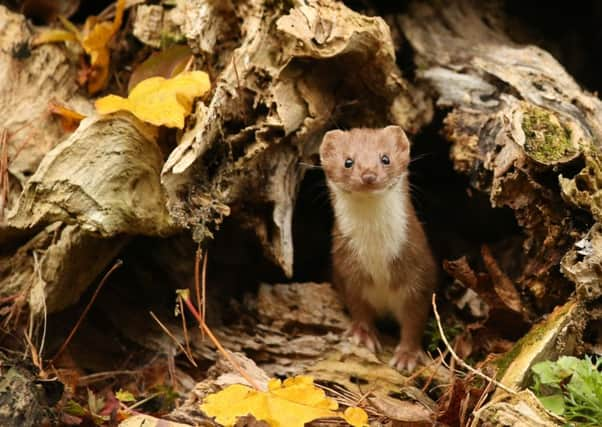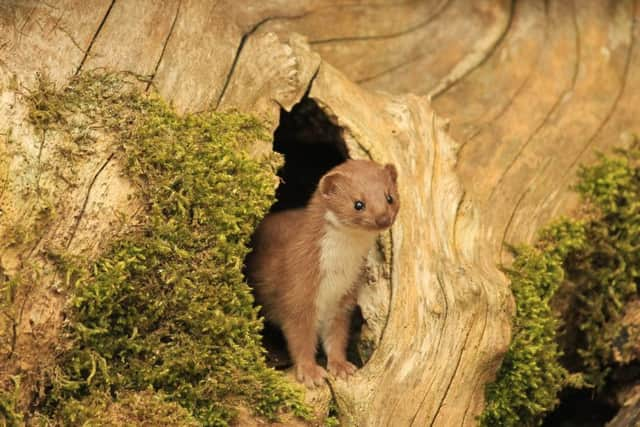Watch: Sneaky surveillance of weasels in artist's back garden


I was spellbound by the image as it went viral on the internet. The photograph conveyed in an instant a quality I had been studying closely all year - the sheer tenacity of this tiny predator.
I’ve been watching weasels in my garden since March and wrote about them in my June column after capturing the female nursing her kits in her nesting chamber on CCTV cameras. My footage inside this wild weasel’s nesting chamber was the first of its kind.
Advertisement
Hide AdAdvertisement
Hide AdSmall enough to slink through a wedding ring and furiously fast; all that most people have ever seen of a weasel is of it flashing across the road before disappearing into the undergrowth.


When I first discovered I had one in my garden I seized the opportunity to use CCTV cameras that I had trained on bird’s nests at the time to study it. But the project soon grew and before long I had 12 cameras tracking its every moment.
I left food out for it in specially-designed feeding boxes fitted with cameras. I even watched the moment it mated with a male, in a vicious act of rough and tumble that you would expect from a creature with a reputation for brutality.
I followed her with even more diligence when she began to look heavy with kits and built her a chamber to nest in, again rigged with hidden cameras.
Advertisement
Hide AdAdvertisement
Hide AdShe went on to have seven kits. I filmed her transporting all seven, one by one, across the garden in full view of more than 30 visitors to my gallery. Later, I photographed the tiny creatures as they took their first steps into the outside world.


One day, I noticed a stoat creeping into their nesting chamber. Thankfully it was seen off by the female weasel, despite the fact that she was six times smaller than the stoat.
Then when the kits were 48-days-old there was a real change in behaviour. The female weasel decided it was time to take them on their first real adventure into the great unknown.
I had rigged cameras and sensors throughout the garden to alert me to their movements. So when a sensor from a hollow log outside my kitchen window triggered an alarm, I knew they were on the move. I opened the window, but the female noticed my movement and quickly pulled the kits into the log by the scruffs of their necks.
Advertisement
Hide AdAdvertisement
Hide AdSeconds later she appeared in the entrance to the log, looking my way. The kits seemed to think this was some sort of game and pounced on her. She made a chittering sound and two kits followed her. They moved as if they were one animal – nose to tail. As they bounded away I watched them dash up into a feeding box that I had placed in a pile of old roots. Meanwhile the other weasels whizzed around the garden. There seemed to be weasels everywhere!
The female was taking them on a grand tour of their territory. After a full morning of exploration, they all headed back to their nest in the back shed where I filmed them from a nearby hide.
It was impossible to count them as they moved through the undergrowth, but ever since I had seen the stoat enter the nest I had been anxious to see if all seven were still alive.
Back at their nest I saw five kits dashing in and out of the holes of a dry stone wall I had built in front of the nest as a backdrop for my photographs. In spite of being just 48-days-old, four of the kits were already bigger than her. I suspected that these were probably the males. The fifth was a female, she was a mini-fuzzy version of her mother. I suspect the stoat had got the other two.
Advertisement
Hide AdAdvertisement
Hide AdLater that day, I heard the chittering call of the adult female. One by one the kits dashed off in the direction of her call. I heard a squealing distress call. I ran over to the meadow area of my garden and parted the tall grasses. There was a weasel kit having a battle with a young rat. They were rolling and writhing about. One moment the weasel seemed to be winning, the next moment the rat had the upper hand. The rat tried biting the weasel’s face.
The weasel wrapped its long body around the rat to deliver a killer bite to the back of its neck; they spun as they tussled. I dashed to the house to get my camera. By the time I got back the weasel was winning the war and the rat’s squeals had subdued.
The weasel had the rat by the throat and was viciously biting into it. It was making sure that rat was not just playing dead. It definitely was dead but it was still flicking and twitching. The weasel had been so caught up in the fight, that it hadn’t noticed me standing right over it filming.
It dashed off into long grasses to eat its meal and I heard another rat being caught by one of the other weasels. The female had obviously taken the young kits on their very first hunting mission.
Advertisement
Hide AdAdvertisement
Hide AdWhat a tough initiation for these youngsters – especially since there was already plenty of food for them in the feeding box. Female rats, like most mammals, fiercely defend their young and are the most dangerous prey to attempt.
I’ve watched cheetah take down gazelle in Africa and this was every bit as dramatic. How incredible to see such a rare sight in my own back garden.
ANIMAL WITH AN IMAGE PROBLEM
Weasels are part of the mustelid family, which also encompasses badgers, stoats, otters, wolverines and pine martens, and are generally the subject of a very poor press.
The very word ‘weasel’ is used to denote a sneaking and untrustworthy character. And yet I can’t help but admire this tiny creature’s ferocity.
Advertisement
Hide AdAdvertisement
Hide AdIt thinks nothing of taking on a creature up to 10 times its size. And it has evolved in remarkable ways – there are species of the weasel family living on every continent except Antarctica.
But until now there has been very little close observation of their behaviour. Population counts are normally conducted by the number that gamekeeper’s trap.
See robertefuller.com for details of Robert’s artwork.